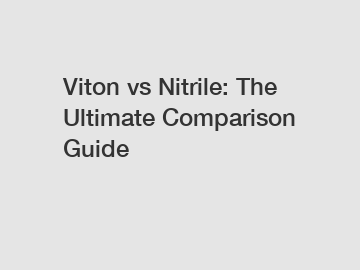When it comes to choosing the right material for sealing and gasket applications, two popular options are Viton and Nitrile. Both materials have their own unique properties and benefits, so it's important to understand the differences between the two in order to make an informed decision. In this guide, we will compare Viton vs Nitrile to help you determine which material is best suited for your specific needs.
**Chemical Resistance**.
Viton is known for its excellent resistance to a wide range of chemicals, including oils, fuels, solvents, and acids. This makes it an ideal choice for applications where exposure to harsh chemicals is a concern. Nitrile, on the other hand, also offers good resistance to oils and fuels but may not perform as well when it comes to more corrosive chemicals. If chemical resistance is a top priority for your application, Viton may be the better choice.

**Temperature Range**.
One of the key differences between Viton and Nitrile is their temperature resistance. Viton has a higher temperature range, with the ability to withstand temperatures ranging from -15°F to 400°F (-26°C to 204°C). Nitrile, on the other hand, has a more limited temperature range of -40°F to 250°F (-40°C to 121°C). If your application requires a material that can withstand extreme temperatures, Viton would be the more suitable option.
**Compression Set**.
Compression set is a measure of how well a material retains its shape after being compressed for a period of time. Viton has a lower compression set compared to Nitrile, meaning it will maintain its seal over a longer period of time. This makes Viton a better choice for applications that require a high level of sealing integrity and durability.
**Cost**.
Cost is always a consideration when selecting a material for sealing and gasket applications. Nitrile is generally more cost-effective than Viton, making it a popular choice for applications where budget is a concern. However, it's important to weigh the cost savings against the performance benefits of Viton, especially if your application requires superior chemical resistance and temperature tolerance.
**Compatibility with Various Fluids**.
When choosing between Viton and Nitrile, it's important to consider the compatibility of each material with the specific fluids that will be present in your application. Viton is compatible with a wider range of fluids, including aggressive chemicals, oils, and fuels. Nitrile is more limited in its compatibility and may not be suitable for applications where exposure to certain chemicals is a concern.
In conclusion, when comparing Viton vs Nitrile, it's important to consider factors such as chemical resistance, temperature range, compression set, cost, and fluid compatibility to determine which material is best suited for your specific application. If you have any further questions or need assistance in selecting the right material for your sealing needs, please do not hesitate to contact us.
If you are looking for more details, kindly visit cow rubber flooring, fkm vs silicone strap, hoof mat.





Comments
0